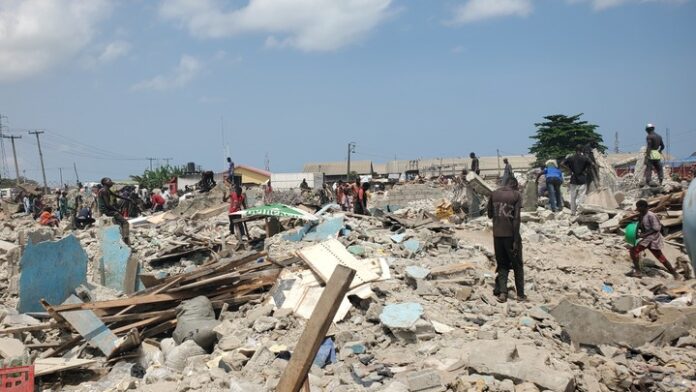A 68-year-old businesswoman, Alhaja Iyabo, has tragically passed away after losing over N50 million in cash during the recent demolition of shanties at the Alaba Rago market in Ojo, Lagos State. This incident underscores the human cost of urban redevelopment efforts and raises questions about the protections in place for small business owners affected by such actions.

Alhaja Iyabo, well-known in the market as a prominent dealer in rice and beans, had stored her weekend earnings in a safe within her shop. The demolition, which occurred on a Sunday morning, came without sufficient warning, leaving many shop owners with no time to secure their belongings. When Alhaja Iyabo returned to the site, she discovered that her shop, along with her savings, had been completely destroyed. The emotional and financial shock of this discovery reportedly triggered a severe heart condition, leading to her untimely death.
The demolition of shanties at Alaba Rago market is part of a broader initiative by the Lagos State Government aimed at urban renewal and infrastructure development. While these efforts are intended to improve living conditions and promote economic growth, they often come at a steep price for those who rely on these spaces for their livelihoods. The loss of Alhaja Iyabo highlights the dire consequences that can result from such projects when they are carried out without adequate planning and support for affected individuals.
Witnesses to the demolition described chaotic scenes as shop owners and traders scrambled to salvage what they could from the debris. Many, like Alhaja Iyabo, were unable to recover their investments and goods. The lack of prior notification and compensation has sparked outrage among the local community, with many calling for the government to reassess its approach to urban redevelopment.
Alhaja Iyabo’s death has sent shockwaves through the market community. Fellow traders and neighbors remember her as a hardworking and generous woman who was always ready to help others. Her passing not only represents a personal loss to those who knew her but also a significant blow to the local economy, as her business was a cornerstone of the market.
This tragic incident raises critical questions about the responsibility of government authorities in protecting the vulnerable populations during redevelopment projects. Adequate compensation, timely notifications, and support systems must be integral components of any such initiative to prevent similar tragedies in the future. The case of Alhaja Iyabo serves as a stark reminder of the human impact of policy decisions and the need for more compassionate and inclusive urban planning.
Moving forward, it is imperative for the Lagos State Government to address the grievances of those affected by the demolition and to implement measures that ensure the safety and well-being of small business owners and traders. Establishing clear communication channels, providing financial assistance, and creating relocation plans are essential steps in mitigating the negative consequences of urban renewal projects.
Victoria Ibiama




